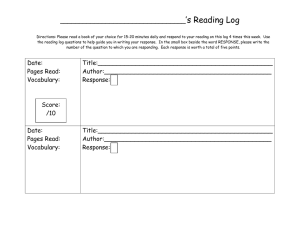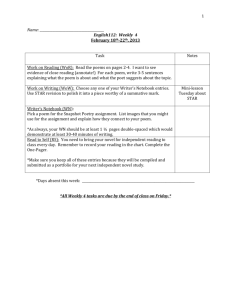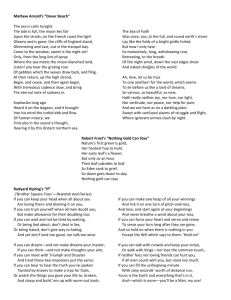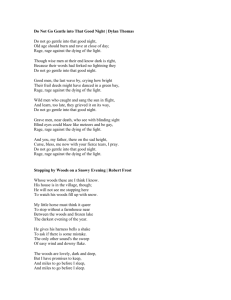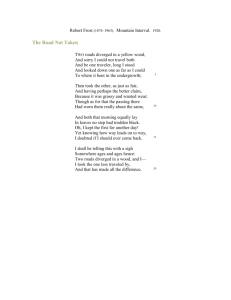Siren Song The Fall of Rome – Introduction to ENG4U1
advertisement
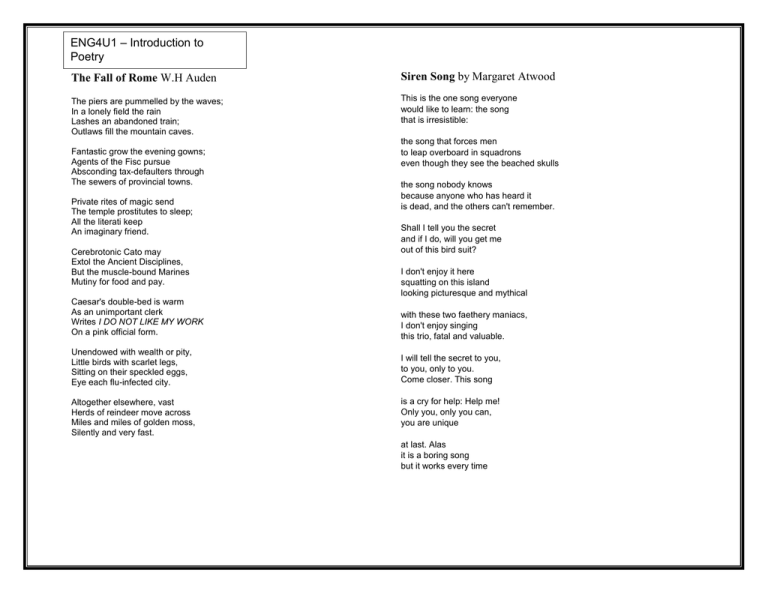
ENG4U1 – Introduction to Poetry The Fall of Rome W.H Auden Siren Song by Margaret Atwood The piers are pummelled by the waves; In a lonely field the rain Lashes an abandoned train; Outlaws fill the mountain caves. This is the one song everyone would like to learn: the song that is irresistible: Fantastic grow the evening gowns; Agents of the Fisc pursue Absconding tax-defaulters through The sewers of provincial towns. Private rites of magic send The temple prostitutes to sleep; All the literati keep An imaginary friend. Cerebrotonic Cato may Extol the Ancient Disciplines, But the muscle-bound Marines Mutiny for food and pay. the song that forces men to leap overboard in squadrons even though they see the beached skulls the song nobody knows because anyone who has heard it is dead, and the others can't remember. Shall I tell you the secret and if I do, will you get me out of this bird suit? I don't enjoy it here squatting on this island looking picturesque and mythical Caesar's double-bed is warm As an unimportant clerk Writes I DO NOT LIKE MY WORK On a pink official form. with these two faethery maniacs, I don't enjoy singing this trio, fatal and valuable. Unendowed with wealth or pity, Little birds with scarlet legs, Sitting on their speckled eggs, Eye each flu-infected city. I will tell the secret to you, to you, only to you. Come closer. This song Altogether elsewhere, vast Herds of reindeer move across Miles and miles of golden moss, Silently and very fast. is a cry for help: Help me! Only you, only you can, you are unique at last. Alas it is a boring song but it works every time The Red Wheelbarrow by William Carlos William dying is fine)but Death by E. E. Cummings so much depends upon dying is fine)but Death a red wheel barrow ?o baby i glazed with rain water wouldn't like beside the white chickens Death if Death were good:for when(instead of stopping to think)you O Captain! My Captain! by Walt Whitman O CAPTAIN! my Captain! our fearful trip is done; The ship has weather'd every rack, the prize we sought is won; The port is near, the bells I hear, the people all exulting, While follow eyes the steady keel, the vessel grim and daring: But O heart! heart! heart! O the bleeding drops of red, Where on the deck my Captain lies, Fallen cold and dead. O Captain! my Captain! rise up and hear the bells; Rise up-for you the flag is flung-for you the bugle trills; For you bouquets and ribbon'd wreaths-for you the shores a-crowding; For you they call, the swaying mass, their eager faces turning; Here Captain! dear father! This arm beneath your head; It is some dream that on the deck, You've fallen cold and dead. My Captain does not answer, his lips are pale and still; My father does not feel my arm, he has no pulse nor will; The ship is anchor'd safe and sound, its voyage closed and done; From fearful trip, the victor ship, comes in with object won; Exult, O shores, and ring, O bells! But I, with mournful tread, Walk the deck my Captain lies, Fallen cold and dead. begin to feel of it,dying 's miraculous why?be cause dying is perfectly natural;perfectly putting it mildly lively(but Death is strictly scientific & artificial & evil & legal) we thank thee god almighty for dying (forgive us,o life!the sin of Death Fire and Ice by Robert Frost Because I could not stop for Death by Emily Dickinson Some say the world will end in fire, Some say in ice. From what I've tasted of desire I hold with those who favor fire. But if it had to perish twice, I think I know enough of hate To say that for destruction ice Is also great And would suffice. Because I could not stop for Death He kindly stopped for me The Carriage held but just Ourselves And Immortality. When You Are Old by William Butler Yeats When you are old and grey and full of sleep, And nodding by the fire, take down this book, And slowly read, and dream of the soft look Your eyes had once, and of their shadows deep; How many loved your moments of glad grace, And loved your beauty with love false or true, But one man loved the pilgrim Soul in you, And loved the sorrows of your changing face; And bending down beside the glowing bars, Murmur, a little sadly, how Love fled And paced upon the mountains overhead And hid his face amid a crowd of stars We slowly drove, he knew no haste And I had put away My labor and my leisure too, For his civility. We passed the School, where Children strove At recess in the ring We passed the fields of gazing grain We passed the setting sun. Or rather, he passed us The dews drew quivering and chill For only Gossamer, my gown My tippet only tulle. We paused before a house that seemed A swelling of the GROUND The roof was scarcely visible The cornice in the ground. Since then 'tis centuries and yet Feels shorter than the DAY I first surmised the horses' heads Were toward eternity I Wandered Lonely As A Cloud by William Wordsworth A Poison Tree by William Blake I wandered lonely as a cloud That floats on high o'er vales and hills, When all at once I saw a crowd, A host, of golden daffodils; Beside the lake, beneath the trees, Fluttering and dancing in the breeze. I was angry with my friend; I told my wrath, my wrath did end. I was angry with my foe: I told it not, my wrath did grow. Continuous as the stars that shine And twinkle on the milky way, They stretched in never-ending line Along the margin of a bay: Ten thousand saw I at a glance, Tossing their heads in sprightly dance. The waves beside them danced, but they Out-did the sparkling leaves in glee; A poet could not be but gay, In such a jocund company! I gazed—and gazed—but little thought What wealth the show to me had brought: For oft, when on my couch I lie In vacant or in pensive mood, They flash upon that inward eye Which is the bliss of solitude; And then my heart with pleasure fills, And dances with the daffodils. And I waterd it in fears, Night & morning with my tears: And I sunned it with smiles, And with soft deceitful wiles. And it grew both day and night, Till it bore an apple bright. And my foe beheld it shine, And he knew that it was mine. And into my garden stole. When the night had veiled the pole; In the morning glad I see, My foe outstretchd beneath the tree Ulysses by Lord Alfred Tennyson It little profits that an idle king, By this still hearth, among these barren crags, Matched with an aged wife, I mete and dole Unequal laws unto a savage race, That hoard, and sleep, and feed, and know not me. I cannot rest from travel: I will drink Life to the lees: all times I have enjoyed Greatly, have suffered greatly, both with those That loved me, and alone; on shore, and when Through scudding drifts the rainy Hyades Vest the dim sea: I am become a name; For always roaming with a hungry heart Much have I seen and known; cities of men And manners, climates, councils, governments, Myself not least, but honoured of them all; And drunk delight of battle with my peers; Far on the ringing plains of windy Troy. I am part of all that I have met; Yet all experience is an arch wherethrough Gleams that untravelled world, whose margin fades For ever and for ever when I move. How dull it is to pause, to make an end, To rust unburnished, not to shine in use! As though to breath were life. Life piled on life Were all to little, and of one to me Little remains: but every hour is saved From that eternal silence, something more, A bringer of new things; and vile it were For some three suns to store and hoard myself, And this gray spirit yearning in desire To follow knowledge like a sinking star, Beyond the utmost bound of human thought. This is my son, mine own Telemachus, To whom I leave the scepter and the isle— Well-loved of me, discerning to fulfill This labour, by slow prudence to make mild A rugged people, and through soft degrees Subdue them to the useful and the good. Most blameless is he, centered in the sphere Of common duties, decent not to fail In offices of tenderness, and pay Meet adoration to my household gods, When I am gone. He works his work, I mine. There lies the port; the vessel puffs her sail: There gloom the dark broad seas. My mariners, Souls that have toiled, and wrought, and thought with me— That ever with a frolic welcome took The thunder and the sunshine, and opposed Free hearts, free foreheads—you and I are old; Old age had yet his honour and his toil; Death closes all: but something ere the end, Some work of noble note, may yet be done, Not unbecoming men that strove with Gods. The lights begin to twinkle from the rocks: The long day wanes: the slow moon climbs: the deep Moans round with many voices. Come, my friends, 'Tis not too late to seek a newer world. Push off, and sitting well in order smite The sounding furrows; for my purpose holds To sail beyond the sunset, and the baths Of all the western stars, until I die. It may be that the gulfs will wash us down: It may be we shall touch the Happy Isles, And see the great Achilles, whom we knew. Though much is taken, much abides; and though We are not now that strength which in the old days Moved earth and heaven; that which we are, we are, One equal-temper of heroic hearts, Made weak by time and fate, but strong in will To strive, to seek, to find, and not to yield. Do Not Go Gentle Into That Good Night by Dylan Thomas Do not go gentle into that good night, Old age should burn and rave at close of day; Rage, rage against the dying of the light. Though wise men at their end know dark is right, Because their words had forked no lightning they Do not go gentle into that good night. Good men, the last wave by, crying how bright Their frail deeds might have danced in a green bay, Rage, rage against the dying of the light. Wild men who caught and sang the sun in flight, And learn, too late, they grieved it on its way, Do not go gentle into that good night. Grave men, near death, who see with blinding sight Blind eyes could blaze like meteors and be gay, Rage, rage against the dying of the light. And you, my father, there on that sad height, Curse, bless, me now with your fierce tears, I pray. Do not go gentle into that good night. Rage, rage against the dying of the light. Sonnet 147: My love is as a fever, longing still by William Shakespeare My love is as a fever, longing still For that which longer nurseth the disease, Feeding on that which doth preserve the ill, Th' uncertain sickly appetite to please. My reason, the physician to my love, Angry that his prescriptions are not kept, Hath left me, and I desperate now approve Desire is death, which physic did except. Past cure I am, now reason is past care, And frantic-mad with evermore unrest; My thoughts and my discourse as mad men's are, At random from the truth vainly expressed. For I have sworn thee fair, and thought thee bright, Who art as black as hell, as dark as night. Digging by Seamus Heaney Bird On The Wire by Leonard Cohen Between my finger and my thumb The squat pin rest; snug as a gun. Like a bird on the wire, like a drunk in a midnight choir I have tried in my way to be free. Like a worm on a hook, like a knight from some old fashioned book I have saved all my ribbons for thee. If I, if I have been unkind, I hope that you can just let it go by. If I, if I have been untrue I hope you know it was never to you. Like a baby, stillborn, like a beast with his horn I have torn everyone who reached out for me. But I swear by this song and by all that I have done wrong I will make it all up to thee. I saw a beggar leaning on his wooden crutch, he said to me, "You must not ask for so much." And a pretty woman leaning in her darkened door, she cried to me, "Hey, why not ask for more?" Oh like a bird on the wire, like a drunk in a midnight choir I have tried in my way to be free. Under my window, a clean rasping sound When the spade sinks into gravelly ground: My father, digging. I look down Till his straining rump among the flowerbeds Bends low, comes up twenty years away Stooping in rhythm through potato drills Where he was digging. The coarse boot nestled on the lug, the shaft Against the inside knee was levered firmly. He rooted out tall tops, buried the bright edge deep To scatter new potatoes that we picked, Loving their cool hardness in our hands. By God, the old man could handle a spade. Just like his old man. My grandfather cut more turf in a day Than any other man on Toner's bog. Once I carried him milk in a bottle Corked sloppily with paper. He straightened up To drink it, then fell to right away Nicking and slicing neatly, heaving sods Over his shoulder, going down and down For the good turf. Digging. The cold smell of potato mould, the squelch and slap Of soggy peat, the curt cuts of an edge Through living roots awaken in my head. But I've no spade to follow men like them. Between my finger and my thumb The squat pen rests. I'll dig with it Homework by Allen Ginsberg If I were doing my Laundry I'd wash my dirty Iran I'd throw in my United States, and pour on the Ivory Soap, scrub up Africa, put all the birds and elephants back in the jungle, I'd wash the Amazon river and clean the oily Carib & Gulf of Mexico, Rub that smog off the North Pole, wipe up all the pipelines in Alaska, Rub a dub dub for Rocky Flats and Los Alamos, Flush that sparkly Cesium out of Love Canal Rinse down the Acid Rain over the Parthenon & Sphinx, Drain the Sludge out of the Mediterranean basin & make it azure again, Put some blueing back into the sky over the Rhine, bleach the little Clouds so snow return white as snow, Cleanse the Hudson Thames & Neckar, Drain the Suds out of Lake Erie Then I'd throw big Asia in one giant Load & wash out the blood & Agent Orange, Dump the whole mess of Russia and China in the wringer, squeeze out the tattletail Gray of U.S. Central American police state, & put the planet in the drier & let it sit 20 minutes or an Aeon till it came out Morning in the Burned House by Margaret Atwood In the burned house I am eating breakfast. You understand: there is no house, there is no breakfast, yet here I am. The spoon which was melted scrapes against the bowl which was melted also. No one else is around. Where have they gone to, brother and sister, mother and father? Off along the shore, perhaps. Their clothes are still on the hangers, their dishes piled beside the sink, which is beside the woodstove with its grate and sooty kettle, every detail clear, tin cup and rippled mirror. The day is bright and songless, the lake is blue, the forest watchful. In the east a bank of cloud rises up silently like dark bread. I can see the swirls in the oilcloth, I can see the flaws in the glass, those flares where the sun hits them. I can't see my own arms and legs or know if this is a trap or blessing, finding myself back here, where everything in this house has long been over, kettle and mirror, spoon and bowl, including my own body, including the body I had then, including the body I have now as I sit at this morning table, alone and happy, bare child's feet on the scorched floorboards (I can almost see) in my burning clothes, the thin green shorts and grubby yellow T-shirt holding my cindery, non-existent, radiant flesh. Incandescent.
